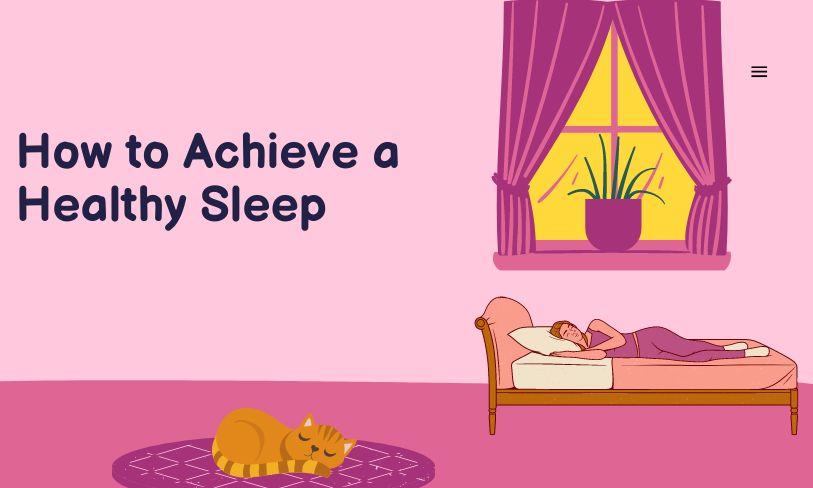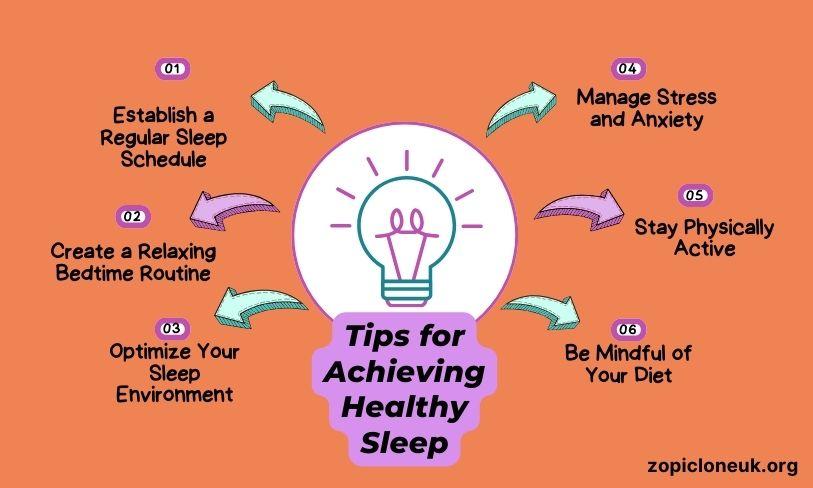
Sleeping Better – How to Achieve a Healthy Sleep:- A good night’s sleep is essential for overall health and well-being. It affects everything from our mood to our ability to focus and perform daily tasks. However, many people struggle to achieve the quality and quantity of sleep they need. This blog will explore practical tips and strategies to help you achieve a healthy sleep pattern and improve your overall sleep quality.
Contents
- 1 The Importance of Sleep
- 2 Tips for Achieving Healthy Sleep
- 3 Using Sleep Aids Responsibly
- 4 Common Sleep Disorders
- 5 FAQ
- 5.0.0.1 What is the ideal amount of sleep for adults?
- 5.0.0.2 How can I create a sleep-friendly environment?
- 5.0.0.3 Can exercise improve my sleep?
- 5.0.0.4 What should I do if I can’t fall asleep?
- 5.0.0.5 Are naps bad for my sleep?
- 5.0.0.6 How does diet affect sleep?
- 5.0.0.7 When should I seek help for sleep problems?
- 6 Conclusion
- 7 Author Details
The Importance of Sleep
Sleep is a vital, often neglected, component of every person’s overall health and well-being. Sleep is important because it enables the body to repair and be fit and ready for another day. Getting adequate rest may also help prevent excess weight gain, heart disease, and increased illness duration.
Sleep Cycles and Stages
Sleep occurs in cycles, each of which is composed of several stages. There are two types of sleep: Non-REM (non-rapid eye movement) and REM (rapid eye movement). Non-REM sleep includes three stages that progress from light to deep sleep. REM sleep is where most dreaming occurs and is essential for emotional regulation and memory consolidation.
Tips for Achieving Healthy Sleep

Establish a Regular Sleep Schedule
Going to bed and waking up at the same time every day, even on weekends, helps regulate your body’s internal clock. This consistency makes it easier to fall asleep and wake up naturally.
Create a Relaxing Bedtime Routine
Develop a pre-sleep routine to wind down. This could include activities such as reading, taking a warm bath, or practicing relaxation exercises like deep breathing or meditation. Avoid stimulating activities and screen time at least an hour before bed.
Optimize Your Sleep Environment
Your bedroom should be a sleep-inducing environment. Keep the room dark, quiet, and cool. Consider using earplugs, an eye mask, or a white noise machine if needed. Invest in a comfortable mattress and pillows that support good sleeping posture.
Be Mindful of Your Diet
Avoid large meals, caffeine, and alcohol close to bedtime. While alcohol might make you feel drowsy initially, it can disrupt your sleep cycle later in the night. Instead, opt for light snacks if you’re hungry before bed.
Stay Physically Active
Regular physical activity can promote better sleep. Aim for at least 30 minutes of moderate exercise most days of the week. However, avoid vigorous exercise close to bedtime, as it can have the opposite effect.
Manage Stress and Anxiety
Stress and anxiety are common culprits of sleep disturbances. Implement stress-reducing techniques such as yoga, mindfulness meditation, or journaling. If persistent stress or anxiety is affecting your sleep, consider seeking professional help.
Limit Naps
While short naps can be refreshing, long or irregular napping during the day can negatively affect nighttime sleep. If you must nap, try to limit it to 20-30 minutes in the early afternoon.
Exposure to Natural Light
Natural light exposure, especially in the morning, helps regulate your sleep-wake cycle. Try to spend some time outside every day and open your blinds or curtains to let in natural light.
Using Sleep Aids Responsibly
Prescription Sleep Medications
For some, prescription sleep medications like zopiclone can be beneficial in the short term. However, they should be used under the guidance of a healthcare provider, as they can have side effects and potential for dependency.
Natural Supplements
Supplements such as melatonin, valerian root, and chamomile can aid sleep. However, it’s important to consult with a healthcare provider before starting any new supplement, especially if you are taking other medications.
Common Sleep Disorders
Insomnia
Insomnia is characterized by difficulty falling asleep or staying asleep. It can be caused by stress, anxiety, medications, or other health conditions. Cognitive-behavioral therapy for insomnia (CBT-I) is an effective treatment that focuses on changing sleep habits and misconceptions about sleep.
Sleep Apnea
Sleep apnea is a serious disorder in which breathing repeatedly stops and starts during sleep. Symptoms include loud snoring, gasping for air during sleep, and daytime fatigue. Treatment often involves lifestyle changes, CPAP therapy, or surgery.
Restless Legs Syndrome (RLS)
RLS is a condition characterized by an uncontrollable urge to move your legs, usually due to discomfort. Symptoms typically occur in the evening, making it difficult to fall asleep. Treatments include lifestyle changes, medications, and addressing underlying conditions.
Narcolepsy
Narcolepsy is a chronic sleep disorder characterized by overwhelming daytime drowsiness and sudden attacks of sleep. Managing narcolepsy involves a combination of medication, lifestyle changes, and support from a healthcare provider.
FAQ
What is the ideal amount of sleep for adults?
Most adults need between 7-9 hours of sleep per night. However, individual sleep needs can vary.
How can I create a sleep-friendly environment?
Keep your bedroom dark, quiet, and cool. Invest in a comfortable mattress and pillows, and use blackout curtains or an eye mask to block out light.
Can exercise improve my sleep?
Yes, regular physical activity can help you fall asleep faster and enjoy deeper sleep. However, avoid vigorous exercise close to bedtime.
What should I do if I can’t fall asleep?
If you can’t fall asleep after 20 minutes, get out of bed and do a relaxing activity until you feel sleepy. Avoid screens and bright lights during this time.
Are naps bad for my sleep?
Short naps (20-30 minutes) can be refreshing, but long or irregular napping can interfere with nighttime sleep. Try to nap in the early afternoon if needed.
How does diet affect sleep?
Avoid large meals, caffeine, and alcohol close to bedtime. Opt for light snacks if you’re hungry before bed. Some foods, like those rich in magnesium and tryptophan, can promote better sleep.
When should I seek help for sleep problems?
If you’ve tried improving your sleep hygiene and still struggle with sleep, it may be time to consult a healthcare provider. They can help identify and treat any underlying sleep disorders.
Conclusion
Achieving a healthy sleep pattern is essential for overall health and well-being. By establishing good sleep hygiene practices, managing stress, and seeking help for underlying sleep disorders, you can improve your sleep quality and enjoy the benefits of restorative sleep. Remember, it’s important to listen to your body and make sleep a priority in your daily routine.
Author Details




Medical content by qualified psychiatrists
Our editorial policy

Zopiclone precautions Read our potential abuse notice

Looking for a seller? Locate the best Zopiclone vendor






